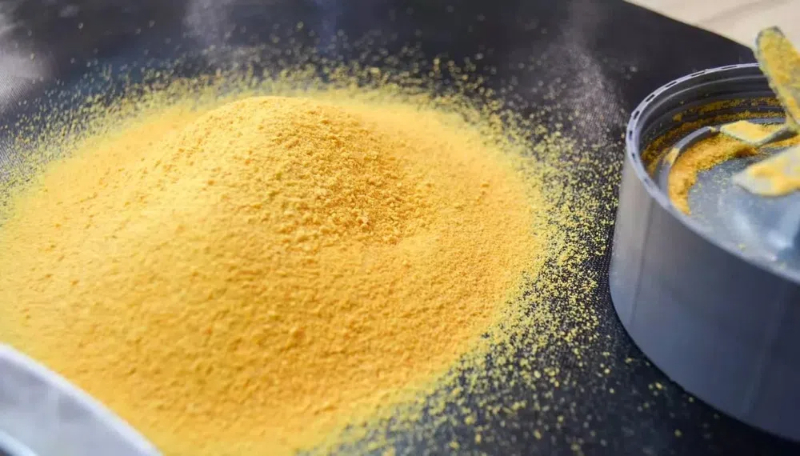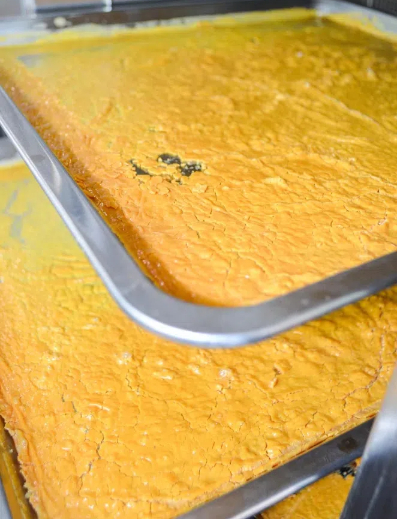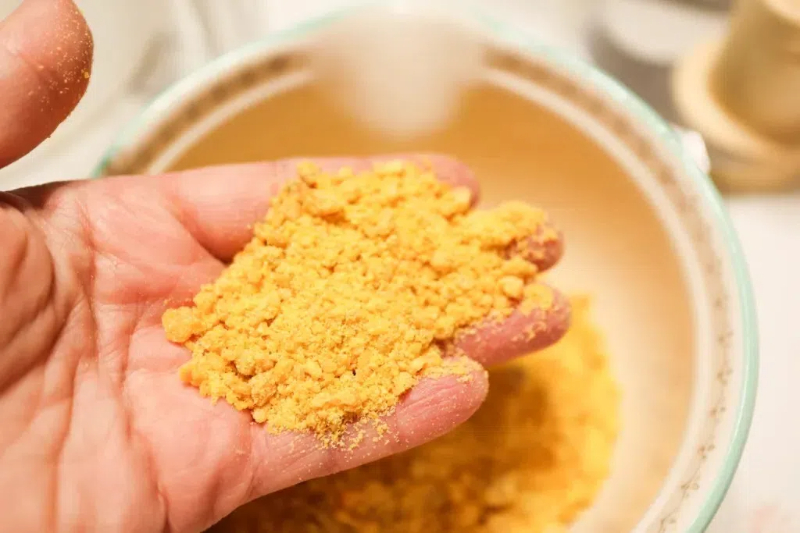
Content Menu
● Understanding the Basics of Dehydration
● Why Dehydrate Eggs?
● Safety Considerations
● Step-by-Step Guide to Dehydrate Eggs
>> Step 1: Gather Your Supplies
>> Step 2: Prepare the Eggs
>> Step 3: Spread on Trays
>> Step 4: Set Up Your Dehydrator
>> Step 5: Check for Doneness
>> Step 6: Grind into Powder
>> Step 7: Store Properly
● Rehydrating Dried Eggs
● Creative Uses for Dehydrated Eggs
● Conclusion
● FAQs
>> 1. Can I dehydrate cooked scrambled eggs?
>> 2. How long do dehydrated eggs last?
>> 3. Can I use any type of egg?
>> 4. What dishes can I make with rehydrated powdered eggs?
>> 5. What should I do if my dehydrated eggs have an off smell?
● Citations:
Dehydrating eggs is an excellent way to preserve them for long-term storage, making them a versatile addition to your pantry. This process not only extends the shelf life of eggs but also reduces their weight, making them convenient for camping, hiking, or emergency food supplies. In this article, we will explore the step-by-step process of dehydrating eggs using a food dehydrator, including safety tips, storage methods, and frequently asked questions.

Understanding the Basics of Dehydration
Dehydration is the process of removing moisture from food to inhibit the growth of bacteria, yeasts, and molds. When it comes to eggs, dehydration can be performed using two primary methods: the wet-dry method and the cook-dry method.
- Wet-Dry Method: This involves beating raw eggs and spreading them on dehydrator trays.
- Cook-Dry Method: This method requires cooking scrambled eggs before dehydrating them.
While both methods are effective, the wet-dry method is generally preferred for its simplicity and efficiency.
Why Dehydrate Eggs?
Dehydrating eggs offers several advantages:
- Long Shelf Life: Properly dehydrated eggs can last for years when stored correctly.
- Lightweight Storage: Dried eggs take up less space and are lighter than fresh eggs.
- Convenience: Dried eggs can be easily rehydrated for various recipes.
Safety Considerations
When dehydrating eggs, it is crucial to ensure food safety. Here are some essential tips:
- Temperature Control: The USDA recommends dehydrating eggs at a minimum temperature of $$ 160^\circ F $$ (about $$ 71^\circ C $$) to eliminate salmonella risk. Most sources suggest a range between $$ 135^\circ F $$ to $$ 145^\circ F $$ for optimal drying without cooking the eggs.
- Quality Eggs: Always use fresh, high-quality eggs from reliable sources. Look for intact shells without cracks or blemishes.
Step-by-Step Guide to Dehydrate Eggs
Step 1: Gather Your Supplies
You will need:
- Fresh eggs
- A food dehydrator
- Non-stick dehydrator trays or parchment paper
- A blender or food processor
- Airtight storage containers
Step 2: Prepare the Eggs
1. Wash Your Hands: Begin by washing your hands thoroughly to prevent contamination.
2. Clean the Eggs: Rinse the egg shells with cool water and mild soap to remove any dirt or bacteria.
3. Crack the Eggs: Crack each egg into a bowl. For larger batches, you can crack multiple eggs at once.
4. Beat the Eggs: Use a whisk or fork to beat the eggs until they are well mixed.

Step 3: Spread on Trays
1. Prepare Trays: Line your dehydrator trays with non-stick sheets or parchment paper.
2. Pour Mixture: Carefully pour the beaten egg mixture onto the trays, spreading it evenly to a thin layer (about $$ 1/4 $$ inch thick).
3. Avoid Overfilling: Do not overcrowd the trays; this can lead to uneven drying.
Step 4: Set Up Your Dehydrator
1. Temperature Setting: Set your dehydrator to $$ 140^\circ F $$ (about $$ 60^\circ C $$) for optimal results.
2. Drying Time: Allow the eggs to dehydrate for approximately 10 to 12 hours. Check periodically for dryness.
Step 5: Check for Doneness
The eggs are done when they are completely dry and brittle. If you notice any brown patches or areas that appear moist, return them to the dehydrator for additional time.
Step 6: Grind into Powder
1. Cool Down: Allow the dried egg sheets to cool completely before handling.
2. Blend: Use a blender or food processor to grind the dried egg sheets into a fine powder.
3. Sift if Necessary: If there are larger pieces remaining, sift them out and return them to the dehydrator if needed.
Step 7: Store Properly
1. Airtight Containers: Store your powdered eggs in airtight containers or vacuum-sealed bags.
2. Label and Date: Always label your containers with the date of dehydration for reference.
3. Storage Conditions: Keep in a cool, dark place away from moisture and heat sources.
Rehydrating Dried Eggs
To rehydrate dried eggs for cooking:
- Use a ratio of approximately $$ 2 $$ tablespoons of powdered egg to $$ 3 $$ tablespoons of water.
- Let it sit for about $$ 5 $$ to $$ 10 $$ minutes before cooking.
Creative Uses for Dehydrated Eggs
Dehydrated eggs are incredibly versatile and can be used in various recipes beyond simple scrambled dishes. Here are some creative ways to incorporate powdered eggs into your meals:
- Baking Goods: Use powdered eggs in cookies, cakes, muffins, and pancakes as a substitute for fresh eggs.
- Breakfast Dishes: Rehydrate powdered eggs and mix with vegetables and cheese for omelets or breakfast burritos.
- Soups and Sauces: Add rehydrated powdered eggs into soups or sauces as a thickening agent while boosting protein content.
- Camping Meals: Perfect for outdoor adventures; simply rehydrate with hot water and cook over a campfire.
- Emergency Preparedness Kits: Store dehydrated eggs as part of your emergency food supply due to their long shelf life and nutritional value.
Conclusion
Dehydrating eggs is a straightforward process that can yield significant benefits in terms of storage and convenience. By following proper safety measures and techniques outlined in this guide, you can create a long-lasting food source that is perfect for various culinary applications. Whether you're preparing meals at home or planning outdoor adventures, knowing how to dehydrate and use powdered eggs will enhance your cooking repertoire while ensuring you have nutritious options on hand at all times.

FAQs
1. Can I dehydrate cooked scrambled eggs?
Yes, you can dehydrate cooked scrambled eggs using similar methods as raw eggs; however, they may have a different texture once rehydrated.
2. How long do dehydrated eggs last?
When stored properly in airtight containers in a cool, dark place, dehydrated eggs can last up to $$ 5 $$ years or more.
3. Can I use any type of egg?
Yes, you can use chicken, duck, or quail eggs; however, ensure they are fresh and clean before dehydration.
4. What dishes can I make with rehydrated powdered eggs?
Rehydrated powdered eggs can be used in baking, scrambled dishes, omelets, and even as an ingredient in pancake mixes.
5. What should I do if my dehydrated eggs have an off smell?
If you notice any off smells after dehydration, it's best to discard them as this could indicate spoilage.
Citations:
[1] https://www.easy-food-dehydrating.com/dehydrate-eggs-safely.html
[2] https://dirtygourmet.com/2015/08/24/eggs-in-the-backcountry/
[3] https://www.backwoodshome.com/dehydrating-eggs-at-home/
[4] https://www.onegoodthingbyjillee.com/make-powdered-eggs/
[5] https://www.survivalfood.com/powdered-egg-recipes/
[6] https://www.dehydratedelight.com/basics/how-to-dehydrate-egg-yolks/
[7] https://www.littlehouseliving.com/dehydrated-eggs-make.html
[8] http://storethisnotthat.com/my-favorite-breakfast-recipes-using-powdered-eggs/
[9] https://thehomesteadinghippy.com/dehydrating-eggs-for-longer-storage/
[10] https://www.egg-machine.com/blog/advantages-of-powdered-eggs.html











